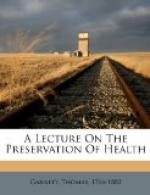This, however, very seldom produces bad effects, unless the exciting powers be improperly or quickly applied; for we can bear a considerable diminution of heat without any bad consequences; and in all cases I hope I shall be able to make it appear, that much more mischief arises from the too great action of heat, than from the diminution of it. Nature never made any country too cold for its inhabitants. In cold climates, she has made exercise, and even fatigue habitual to them, not only from the necessity of their situation, but from choice; their natural diversions being all of the athletic or violent kind. But the softness and effeminacy of modern manners, has both deprived us of our natural defence against the diseases most incident to our climate, and subjected us to all the inconveniencies of a warm one.
People are afraid of going out into the cold air; but if they conduct themselves properly afterwards, they will never be in the least danger from it. Indeed the action of cold, unless it be excessive, never produces any bad effects.
Many of you will, no doubt, think me here in an error; but I hope you will not long entertain that opinion. You will say that you have had frequent experience to the contrary; that you have often gone out into the cold air, and have caught dreadful colds. That this is owing to the action of cold, I will deny; nay, I will assert, that if a person go out into air which is very cold, and remain in it for a very long time, he will never perceive any symptoms of what is called a cold so long as he remains there.
A common cold is attended with a running of the nose, hoarseness, and cough, with a considerable degree of feverish heat, an dryness of the skin.—Now it is universally agreed, that this disorder is an inflammation, or is of an inflammatory nature; it is an inflammation of the smooth, moist skin which lines the nostrils, and goes down the wind-pipe into the lungs; but as cold is only a diminution of heat, or a diminution of a stimulus acting upon the body, it is impossible that such a diminution can cause a greater




